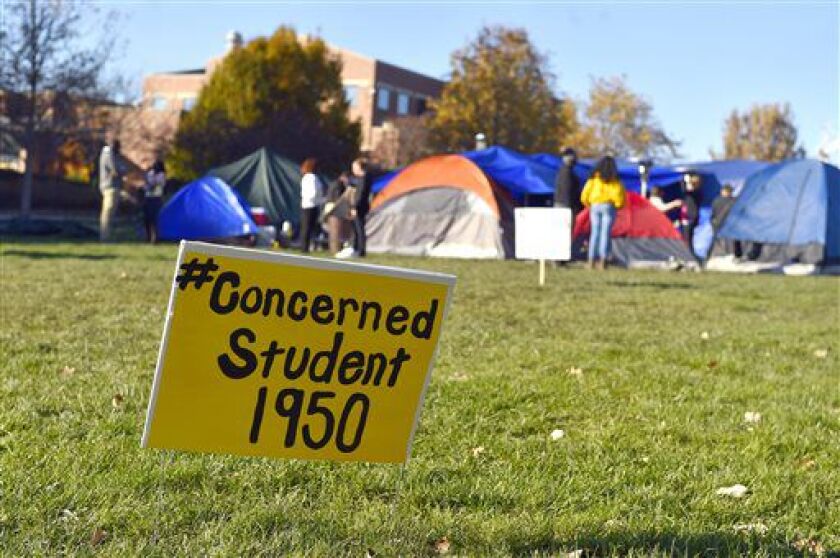COLUMBIA, Mo. — Student protests over racial incidents at the University of Missouri escalated over the weekend when at least 30 black football players announced they will not participate in team activities until the university system’s president is removed.
President Tim Wolfe gave no indication he has any intention of stepping down, but he agreed in a statement Sunday that “change is needed” and said the university is working to draw up a plan by April to promote diversity and tolerance.
For months, black student groups have complained of racial slurs and other slights on the overwhelmingly white, 35,000-student campus. Their frustrations flared during the homecoming parade on Oct. 10 when black protesters blocked Wolfe’s car and he would not get out and talk to them. They were removed by police.
On Saturday night, black members of the football team joined the outcry, and by Sunday, state lawmakers were weighing in.
The athletes did not say explicitly whether they would boycott the team’s three remaining games this season. The Tigers’ next game is Saturday against Brigham Young University at Arrowhead Stadium, the home of the NFL’s Kansas City Chiefs, and canceling it could cost the school more than $1 million.
“The athletes of color on the University of Missouri football team truly believe ‘Injustice Anywhere is a threat to Justice Everywhere,’ ” the players said in a statement. “We will no longer participate in any football related activities until President Tim Wolfe resigns or is removed due to his negligence toward marginalized students’ experience. WE ARE UNITED!!!!!”
Head football coach Gary Pinkel expressed solidarity with the black players on Twitter by posting a picture of the team and coaches locking arms. The tweet said: “The Mizzou Family stands as one. We are united. We are behind our players.”
Practice and other team activities were canceled on Sunday, Pinkel and Missouri athletic director Mack Rhoades said in a joint statement. The statement linked the return of the protesting football players to the end of a hunger strike by a black graduate student who has vowed to not eat until Wolfe is gone.
“Our focus right now is on the health of Jonathan Butler, the concerns of our student-athletes and working with our community to address this serious issue,” the statement said.
The protests at the campus began after the student government president, who is black, said in September that people in a passing pickup truck shouted racial slurs at him. Days before the homecoming parade, members of a black student organization said slurs were hurled at them by an apparently drunken white student.
Also, a swastika drawn in feces was found recently in a dormitory bathroom.
Butler, who participated in the homecoming parade protest, began his hunger strike on Nov. 2 to call attention to racial problems at the state’s flagship university.
Many of the protests have been led by an organization called Concerned Student 1950, which gets its name from the year the university accepted its first black student. Its members besieged Wolfe’s car at homecoming last month, and they have been conducting a sit-in on a campus plaza since last Monday.
At least 150 students gathered Sunday night to pray, sing and read Bible verses. Many planned to camp there overnight amid temperatures that had dropped into the low 40s.
Concerned Student 1950 has demanded, among other things, that Wolfe “acknowledge his white male privilege,” that he be removed immediately, and that the school adopt a mandatory racial-awareness program and hire more black faculty and staff.
One of the sit-in participants, Abigail Hollis, a black undergraduate, said the campus is “unhealthy and unsafe for us.”
“The way white students are treated is in stark contrast to the way black students and other marginalized students are treated, and it’s time to stop that,” Hollis said. “It’s 2015.”
Wolfe said Sunday that most of the group’s demands have already been incorporated into the university’s draft plan for promoting tolerance.
“It is clear to all of us that change is needed,” he said.
Already, at Chancellor R. Bowen Loftin’s request, the university announced plans to require diversity training for all new students starting in January, along with faculty and staff.
State lawmakers began to react Sunday. The chairman of a Missouri House higher education committee, Poplar Bluff Republican Rep. Steven Cookson said in a statement that Wolfe “can no longer effectively lead” and should leave his post. Joining him in calling for Wolfe’s resignation was Assistant House Minority Leader Gail McCann Beatty, the highest-ranking black member of that chamber.
Late Sunday, the university system’s governing body, the Board of Curators, announced a special meeting had been set for Monday. A statement indicated part of the meeting will be closed to the public. A system spokesman didn’t immediately respond to questions about the meeting’s agenda.
Wolfe, 56, is a former software executive and Missouri business school graduate whose father taught at the university. He was hired in 2011 as president of a four-campus system that includes Columbia, succeeding another former business executive who also lacked experience in academia.
The campus in Columbia is about 120 miles west of Ferguson, the St. Louis suburb where tensions erupted over the shooting death of Michael Brown, an 18-year-old unarmed black man, last year by a white police officer.
The school’s undergraduate population is 79 percent white and 8 percent black. The state is about 83 percent white and nearly 12 percent black.
It’s the latest controversy at the university in recent months, following the suspension of graduate students’ health care subsidies and an end to university contracts with a Planned Parenthood clinic that performs abortions.
Two graduate student groups have called for walkouts by graduate student workers on Monday and Tuesday in solidarity with the protesters.
SUMMER BALLENTINE AND ALAN SCHER ZAGIER, Associated Press
Associated Press writer Ralph D. Russo in New York contributed to this report.






